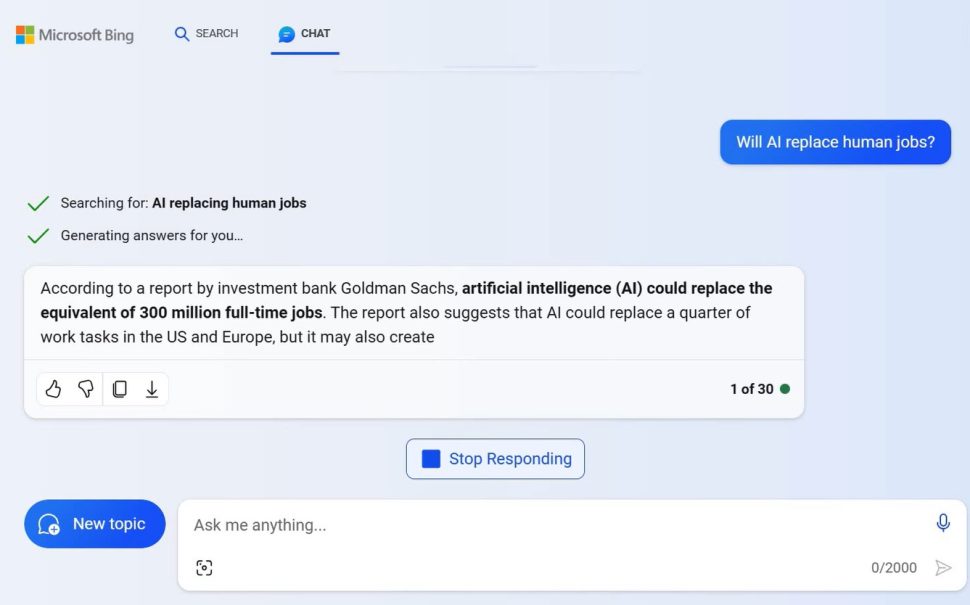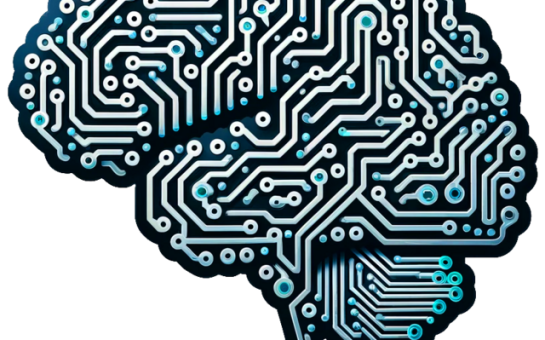The emergence of artificial intelligence is fundamentally reshaping the landscape of work. This technological advancement, which was once confined to science fiction, now stands as a defining element, certain to revolutionise our jobs and labour markets.
The integration of AI into various industries raises both intrigue and concern, leading to discussions around its potential to redefine job roles, automate tasks, and fundamentally alter the job market. But the common ground of all debates is one primary question: will AI enhance existing roles or displace them?
This transformation brings with it a dichotomy. On one side, efficiency, innovation, and the creation of new job opportunities; on the other, concerns remain about job displacement, skill eliminations, and societal disparities.
Dr Grace Lordan, economist and associate professor at the London School of Economics and Political Science, believes whether or not artificial intelligence impacts jobs depends on the direction it goes in, which is still unknown.
“You have people like Elon Musk who will say that all the jobs will be gone,” she said. “Then you have a lot of people like Christopher Pissarides, one of our Nobel laureates at the London School of Economics, who is very optimistic about artificial intelligence and doesn’t think that AI will change too much the number of jobs available. The beliefs of people become really important here.
“I think it’s very important that governments, stakeholders, and citizens of countries, really get involved to think about what they would actually want since the artificial intelligence direction is determined by human beings.
“At the moment, this is determined by a very select type of people who work in the field in three or four countries around the world. So, it’s not necessarily representative.”
AI reshaping work: The end of routine tasks
Recent studies indicate that the continued implementation of AI technologies will bring about a considerable transformation in the labour market over the coming years. Experts predict that advances in AI and automation will fundamentally reshape the nature of work, leading to significant job displacement.
Goldman Sachs research published in March warned that at least a quarter of work tasks of up to 300 million full-time jobs will be automated in the US and Europe in the coming years due to a new wave of AI systems.
A large proportion of human jobs replaced by AI will be especially those that are routine, repetitive, or low-skilled. Jobs that remain will likely require more technical expertise, analytical thinking, creativity, and adaptability.
According to the World Economic Forum’s Future of Jobs Report 2023, clerical or secretarial roles are likely to decline more quickly than other occupations. These jobs often involve tasks that follow set patterns and rules and include data entry, organising information, scheduling, and handling routine communication—all tasks that artificial intelligence and automation excel at.
Dr Lordan believes artificial intelligence is reshaping the labour market by replacing some of the entry-level roles, but senior jobs which require more abstract thinking and innovation are going to exist.
“There are some good examples of careers like in accountancy and in legal services where entry-level jobs could potentially be replaced by AI. But of course, we still need younger people to enter those jobs,” said Dr Lordan.
Will AI generate more jobs than it destroys?
As artificial intelligence systems grow more advanced, automating an array of jobs, many experts predict AI will also create new kinds of work even as it displaces many existing roles.
But will the created jobs compensate for the roles replaced by AI?
“For the first time, we’re potentially heading into a phase where more jobs are destroyed than are actually created, which has a big role for government,” said Dr Lordan.
According to the World Economic Forum’s report, 83 million jobs will be lost, and 69 million jobs will be created by 2027, which means a 14 million (2%) overall reduction in employment.
AI will generate new roles in areas like training and maintaining AI systems, curating data to improve machine learning models, and jobs focused on uniquely human skills like the creativity that will complement smart algorithms. AI trainers, AI content creators, AI engineers, and AI ethicists are just a few examples of already emerging roles.
While new jobs will undoubtedly emerge, there are no guarantees that displaced workers will transition easily into these new roles, given potential skill mismatches.
The skills gap and inequality: challenges in AI reskilling
While new occupations will emerge from AI implementation, displaced employees may struggle to develop the new technical skills required for these jobs. There will be a skill and training gap as employees try to shift from routine tasks automated by AI into more specialised work focused on building, managing and maintaining AI systems.
According to the Oxford Institute of Population Ageing, older adults are more vulnerable to the impacts of automation and AI in labour markets than any other age group. Transitioning to new roles requires rapid retraining, but senior workers often face more barriers to gaining new technical skills later in life.
Managing the AI-driven reskilling of the workforce risks creating “the biggest inequality in societies”, in Dr Lordan’s view. She sees the solution as a whole reconstruction of a social norm where people are allowed to reinvent themselves regardless of their age to get a new career, but societies are still far from achieving that.
“So if you are a younger person and if you’re lucky enough to get the job at a scale-up that actually has a lot of money from private equity or venture, they will invest an incredible amount of money in getting you skills,” she said. “For the rest of the people, that investment isn’t made, and we rely on the government in order to make that investment.
“And unfortunately, around the world, I think governments aren’t thinking enough about how to upskill people in a way that allows them to continue in the labour market.”
Productivity and efficiency: Assistant AI
The positive aspect of this shift is that artificial intelligence is redefining the work environment by augmenting human skills. AI helps automate some time-consuming tasks, freeing up employees to focus more on complex and creative work. It can also do some tasks that are difficult or impossible for human beings to do.
Dr Lordan added: “Artificial intelligence can be really helpful if people are trying to solve a hard problem. It doesn’t give you a perfect solution, but it gives you some solutions that allow you to be much more efficient. People are already using AI, so what will happen in the short term is that AI will make them more effective at work.”
According to the report published by Autonomy in November 2023, with the implementation of AI, the working hours of 88% of the labour market in Great Britain (27.9 million workers) can be reduced by at least 10% over the next decade. Also, for 8.8 million workers (28% of the workforce in Great Britain), a four-day week could be achieved.
“So, I think the good thing about artificial intelligence is that it allows people to do what they’re doing at greater speed. And because of that greater speed, they’ll get to take a bit more time off,” said Dr Lordan.
AI for societal benefit: Ensuring inclusive growth
Artificial intelligence can influence economic growth through its impact on the labour market. At the same time, an important question arises: how to harvest this growth to the benefit of the society?
Dr Lordan said: “It is fundamentally important that the money generated by artificial intelligence be captured by the government. It also needs to be trickled down and given to people who are the poorest in our society, as well as to people who have job displacements so they can get reskilled, or even if they can’t get reskilled, they can have a living wage.
“We’ll definitely see growth, we’ll definitely see productivity from artificial intelligence. The question is, are the governments going to be smart enough or care enough to make sure that that money gets captured by the country, rather than some people who happen to be billionaires already?”




